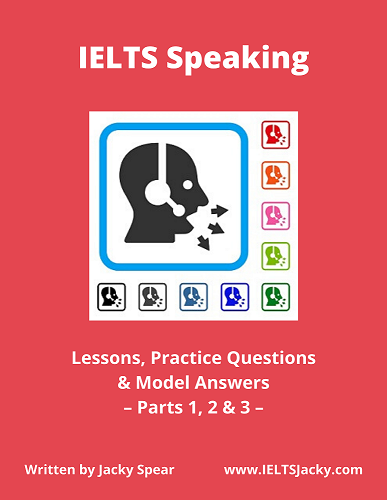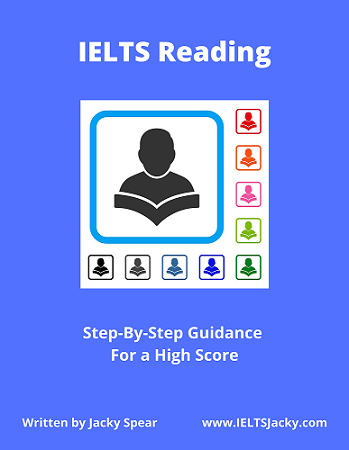IELTS
Speaking Tips
9 Steps To a High Score in Your Speaking Test
Here are my top IELTS Speaking tips to make your preparation easy and increase your chances of scoring highly in your test.
For many students, the Speaking test is the most challenging part of the IELTS exam. This is for two main reasons:
- You have minimal thinking time before answering a question.
- It can be difficult to practise speaking English.
Neither of these issues applies to Writing, Reading and Listening. For these other parts of the exam, you do have at least a little time to consider your answers without an examiner sitting in front of you expecting an immediate response.
Also, it’s simple to sit down and practise writing English, read an English magazine or listen to an English podcast.
To practise speaking in English is another matter altogether. Who do you talk to? What do you talk about? Even if you take English classes, you probably don’t get very much time actually speaking in each lesson.
With these 9 IELTS Speaking tips, you’ll overcome the challenges and be well prepared when the day of your test arrives.
Top 9 IELTS Speaking Tips
Here are my top IELTS Speaking Tips to increase your score.
1) Commit To Speaking English Every Day
2) Practise Answering IELTS-Style Questions
3) Grow Your Vocabulary
4) Know the Exam
5) Understand What You’ll Be Tested On
6) Know Your Strengths & Weaknesses
7) Practise Identifying Grammatical Structures
8) Focus on Fluency
9) Work on Your Pronunciation
Tip 1: Commit To Speaking English Every Day
The
great thing is, you don’t have to have a speaking partner to practise speaking
English and for the first of our IELTS Speaking tips, you don’t need anyone
else.
The practise technique I recommend you use will teach you to think in English. This is one of the most valuable skills you can develop. It’s a very simple technique and will fit easily into your everyday life.
Learn all about it on this page: IELTS Speaking Practise – Learn How To Think in English
Learning to think in English will help you to speak faster and with greater accuracy and fluency. You’ll quickly see a massive improvement in your speaking skills and your language will sound far more natural. Start using it today.
Tip 2: Practise Answering IELTS-Style Questions
Plan a timetable with a set number of mock speaking tests each week. You might, for example, do one every other day or on three sets day each week. Only you know how much time you have available to focus on the speaking part of the exam and how much more practice you need.
The more you do, the better you’ll be prepared for the test. If you are really pushed for time, make sure that you do at least one a week. If you are keeping to the timing of the test, it will take less than 15 minutes.
Do allow yourself more thinking time while you’re learning how to develop answers for the different parts of the test.
These pages have step-by-step help for developing Part 1, 2 and 3 answers:
IELTS Speaking Part 1 – 7 simple methods for developing your answers, with examples
IELTS Speaking Part 2 – Test format, understanding cue cards & 5 test mistakes to avoid
- Part 2 Planning Strategy – Method 1: ‘question prompt’ + planning notes & sample answers
- Part 2 Planning Strategy – Method 2: ‘brainstorming’ + planning notes & sample answers
- Part 2 Planning Strategy – Method 3: ‘the 5 senses’ planning notes & sample answers
Part 2 Introduction: How to begin
your IELTS Speaking Part 2 talk & top tips for gaining extra marks.
IELTS Speaking Part 3 – 6 common
types of questions & how to answer them
To save you time searching for practise questions online, I’ve created 30 mock tests for you. Visit this page to find out more and download them for free. Download them now and get practising.
IELTS Speaking Questions – 30 full mock tests (30 topics – 330 questions altogether)
There are also more practise Speaking questions, with sample answers, on the topic vocabulary pages listed in the side bar àààà
If you have someone to ask you the questions, and time your answers, that’s great, but, as with IELTS Speaking tip 1, don’t worry if you haven’t.
If you’re practising alone, it’s important to speak your answers out loud just as you will in the test. I recommend that you record yourself, whether you’re on your own or with a partner, then you can play it back later to listen out for specific things you need to improve.
Tip 3: Grow Your Vocabulary
Vocabulary makes up 25% of your mark for the Speaking and
Writing parts of the IELTS exam. Knowing a broad range of words is also
essential for scoring well in the Listening and Reading tests.
Learning topic vocabulary is one key aspect of increasing your word power. Use the topic vocabulary pages I’ve just mentioned to help you with this. The words and phrases are relevant for all four parts of the IELTS exam as any given topic could come up in a Speaking, Writing, Reading or Listening question.
There’s lots of help on how to learn vocabulary and what else to learn on these pages:
Top 6 Types of IELTS Vocabulary
Tip 4: Know the Exam
It’s
vital that you understand the format of the Speaking test. If you know exactly
what to expect, you’ll already be a step closer to achieving the result you
want. You’ll be well prepared and not facing surprises on the day that will
prevent you from doing your best.
All the information you need is set out on the IELTS Speaking Parts 1, 2 and 3 pages I listed above. Check them out now if you haven’t already done so. Here are the links again:
You’ll have a great deal more confidence going into the test and will perform better if you know what’s going to happen and what will be expected of you.
Tip 5: Understand What You Will Be Tested On
This
is one of the most important of our IELTS Speaking tips. If you don’t know what
the examiner is looking for, how can you be sure that you’re giving it to them?
Don’t risk a low grade simply because you fail to understand what the test is really about.
The IELTS Speaking test is designed to assess your ability to:
- Communicate opinions and information on everyday topics and common experiences
- Speak at length on a given topic using appropriate language
- Organise your ideas coherently
- Express and justify your opinions
- Analyse, discuss and speculate about issues
So what, specifically, are you tested on? Just these 4 things:
- Fluency and Coherence
- Vocabulary
- Grammar
- Pronunciation
They each hold 25% of the marks.
Equally important is what you are NOT tested on:
- You won’t be assessed on the content of what you say.
- You won’t be tested on your knowledge or your intelligence.
- You are not expected
to be an expert on the subjects they ask you about.
The examiner just wants to hear your opinions and how well you communicate them. That’s it.
Tip 6: Know Your Strengths & Weaknesses
One of the challenges of being a language
learner is that you can’t always recognise your own mistakes. However, you will
be aware of what you are good at and what aspects of your language skills you
really need to work on. This is the subject of the sixth of our IELTS Speaking
tips.
Be totally honest with yourself. Which of the four areas of assessment is your weakest – fluency and coherence, vocabulary, grammar or pronunciation? Maybe it's particular aspects of several of these.
Identify where you need to make the most improvement and plan your timetable accordingly. If you give equal emphasis to the things you have already mastered and those you are not so good at, then you’re wasting valuable preparation time.
Earlier I suggested recording yourself speaking English. When you do this, you will notice things that need improvement that you might not otherwise be aware of.
Here are some of the sorts of things you might notice:
- You repeat the same words and expressions frequently rather than varying your vocabulary.
- You pause and hesitate a lot.
- Your voice is monotone with little variation in your intonation.
- You focus too much on grammatical accurately at the expense of fluency.
Don’t be worried about your errors as they are part of the learning process. Recognise them and use them to improve.
Tip 7: Practise Identifying Grammatical Structures
Using the correct tense is obviously an important aspect of grammatical accuracy. However, it’s very common for candidates to use the wrong tense when answering questions despite it being a pretty basic error.
The result is that they don’t actually answer the question. This sort of mistake occurs all too frequently in the Speaking test and it’s one of the main reasons why people score poorly for grammar. This makes Tip 7 one of the most important IELTS Speaking tips.
There’s a simple way to avoid this problem. Identify the tense the examiner uses in their question and use the same one in your answer.
Let me show you what I mean with a poor answer and a good one.
Question: Have you ever been abroad?
Subira: I’m going to the USA in September?
The question is asked in the past tense but the answer is given in the future tense. Because of this, Subira hasn’t answered the question.
Here’s a better answer.
Subira: No, I’ve never visited a foreign country but I’m going to the USA in September?
Not only does Subira correctly use the past tense in the
first part of her answer, but she also adds a second clause in the future
tense. This will earn her good marks.
So, here are the two rules for using the right tense for the main clause of your answer:
- Answer the question.
- Answer
using the same tense as in the question.
For practice, get a friend to ask you some simple questions using past, present and future tenses and see if you can quickly identify the verb tense in each one.
Here are three examples:
- What did you have for breakfast this morning? (Past tense)
- Do you like Sally’s new hair style? (Present tense)
- Where do you
want to go on holiday next year? (Future tense)
Tip 8: Focus on Fluency
For the next of our IELTS Speaking tips, we’re
going to go a step further with the technique I introduced you to in Tip 1 –
learning to think in English.
Poor fluency is often caused by the fear of making mistakes. This leads to the speaker pausing and hesitating far too much or speaking too slowly as they try to get their grammar and vocabulary perfect.
Since fluency carried 25% of the marks, you need to get a good balance between correct language and fluent speech. The only way to do this is to practise.
The method I’m going to suggest is something for you to do on your own so that you aren’t worried about making mistakes. There are many ways you could do it but here are two.
1) Towards the end of the day, think of one thing that went really well or that you are happy about and something that could have been better.
Talk out loud about them for 1 minute, focusing on fluency.
This will also be great practise for using the past tense, but also conditionals and modals (‘If I had…’ ‘I should have…’) which are more advanced grammar and will impress the examiner if you use them.
2) Choose a photo in a newspaper or magazine and talk out loud about it for at least 1 minute.
Here are a few ideas as to what to say:
- Introduce the subject matter.
- Describe what you can see.
- Talk about any activity that is going on in the photo. (present)
- Guess what might have been going on before it was taken. (past)
- Suggest what might happen next. (future)
If
you vary the type of subject matter you choose for this activity, you will be
practicing a wide variety of language. For example, choose a picture of a beautiful
room or landscape one day and a topical news item the next.
Record and play back your talks to assess your fluency. It will very quickly begin to improve.
Tip 9: Work on Your Pronunciation
Pronunciation should perhaps have come top of our list of IELTS Speaking tips. Why? Because, if you have poor pronunciation and the examiner can’t understand what you’re saying, they have no way of assessing your English language skills.
You won’t be expected to sound like a native English speaker. Indeed, many nationalities speak English and each has their own accent and slightly different ways of using intonation.
What you will be assessed on is how easily the examiner can understand you and how well you pronounce the key sounds of the English language.
Pronunciation is generally the last skill that English learners master so the requirement for a high band score, say a Band 7, are actually quite low. Having said that, any small improvements you can make will increase your marks.
Use these 4 methods:
1) Listen to spoken English every day.
There are many ways to do this. Use the resources I recommend on my IELTS Resources page.
Podcasts and radio shows are better than TV and videos because you will only be listening to the language rather than being distracted by the visuals. You’ll find spoken material on almost any subject you can imagine.
2) Focus in
Record short extracts from these sources and replay them over and over again so that you can study and copy the stress and intonation.
3) New Vocabulary
When you learn new words, make sure that you learn and practise their pronunciation as well.
All good online dictionaries have an audio button so that you can hear the word spoken, as well as a phonetic transcription of how each word is pronounced. I especially recommend the Cambridge Online Dictionary.
I have also added audio tracks to all my topic vocabulary pages so that you can hear the correct pronunciation of all the words and phrases.
4) Identify Common L1 Errors
It can be really helpful to identify the common pronunciation errors in your L1 language so that you can focus in on them, or at least be aware of where key pronunciation challenges may lie.
Just Google the phrase ‘common pronunciation mistakes in English for _______ speakers’. Insert your own language in the space. You should find several websites that list common errors in your native language.
This is one of the best IELTS Speaking tips for improving your pronunciation that I can give you.
That brings us to the end of our top 9 IELTS Speaking tips.
Do read all the pages I’ve high directed you to. They will help you with everything I’ve talked about on this page and are also packed full of additional IELTS Speaking tips.
Want to watch and listen to this lesson?
Click this video.
Like this page?
More Help With IELTS Speaking
You'll find even more IELTS Speaking tips and information on these pages:
IELTS
Speaking Test: Know the format & understand what you’ll be assessed on. Discover the main reason for low scores & how to avoid this big mistake.
IELTS Speaking Topics: Discover 40+ common subject areas for the IELTS Speaking Test.





















